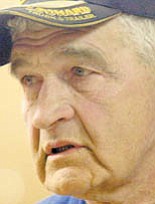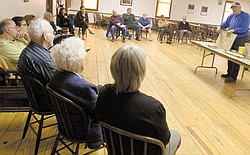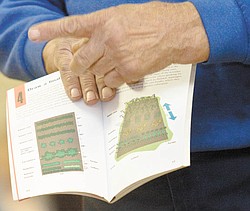Tips to grow on
Longtime gardener shares his expertise
By Jeanne Starmack
Edinburg, Pa.
James Harding
James Harding of Edinburg, Pa., teaches a gardening class at the Mahoning Valley Grange on Skyhill Road in Edinburg.
Harding shows examples from a book of what not to do when it comes to gardening.
Tomato Tips
Unlike cool-weather plants that include spinach, Swiss chard, carrots, lettuce, onions and beets, tomatoes should be planted after frost is no longer a threat. How to plant, according to longtime gardener James Harding:
Wash your tomato plants by turning them upside down in a bucket of water warmed by the sun.
Dig a hole twice the size of the plant.
Put a mound of compost sprinkled with Epsom salts in the bottom of the hole.
Shake and “tickle” the roots of the plant.
Set the plant on top of the compost mound.
Fill the hole in with more compost and soil.
Shade plants from the hot sun between 11 a.m. and 2 p.m.
You can save tomato seeds from one year to the next, Harding says. Place them on a paper towel in rows, fold the towel up and put it in the freezer. The next year, take the paper towel out, place it on the ground, wet it, put an inch or two of dirt over it, and the tomato seeds will sprout. Transplant the sprouts into your garden.
James Harding’s seven decades of gardening experience is fertile ground from which novice dirt-turners can harvest much knowledge.
Whether it’s when to plant your spinach or how to plant your tomatoes, the Harbor-Edinburg Road man can offer advice.
He can tell you how to plant your rows and how to keep the bugs away.
He has warnings about what the hot sun and heavy rains can do to tender shoots.
He tells you how to wash your plants and clip them and nourish them, coaxing them to grow the way you want. “Gardening is like raising children,” he proclaims.
He wants you to have a good harvest, because he believes people should get out into their yards and garden again.
In tough economic times, it’s practical. And for localvores, well, you can’t get more local than your own backyard.
“I stopped in at the WalMart the other day,” Harding said Thursday evening before beginning an hourlong presentation at the Mahoning Valley Grange on Skyhill Road. “They wanted $1.49 for a tomato. Back when I was a kid, $4 would buy you a whole bushel.
“And where was it grown? I know where mine was grown.”
Harding began gardening when he was 4 at his grandfather’s side, and he still follows the old ways.
No chemicals allowed — use manure or composted leaves, he said. Add such natural fertilizers to your soil “all the time.”
He doesn’t need state-of-the-art, store-bought tools, either.
If you’ve got a broken snow-shovel handle and a piece of an old lawn-chair leg, you can put together a tool for digging out carrots.
If you have a stick and an old two-by-four, you can have shade for your transplants in the hot sun between 11 a.m. and 2 p.m. You also can use your shading tool to protect vulnerable transplants and tomato plants from being beaten down by hard rain.
A 4-foot-long piece of pipe is perfect for circling out spaces for seeds, which Harding keeps clipped to his waist in an old antifreeze container that he cut in half. A handleless pancake turner laced between the teeth of a long-handled onion fork makes a great hoe.
He likes to think of it as recycling.
Harding gardens in a 50-by-50-foot area, planting his vegetables in rows that are only 4 feet long. He replants the rows every two to three weeks. That way, he says, the produce gets eaten while it’s still young and tender.
If you plant more than 4 feet of one vegetable, he said, you might as well go to the store and buy it “’cause it’s old.”
He plants his rows north to south instead of east to west, because the sun encourages plants to lean to the east. If they’re planted north to south, they won’t lean on one another.
He also repels bugs without killing them, because some bugs are good for the garden. He spreads grass clippings around his plants. Bugs snub the dry, tasteless clippings and move on.
When he weeds, Harding gently works the weeds loose on one side, then the other. They’re easier to remove then.
When he waters, he doesn’t use a hose. He warms his water in 5-gallon buckets in the sun because he doesn’t believe plants like a shocking spray of cold water any more than humans do.
And when it’s time to harvest your produce, don’t pull on the plant, he says. That can stress it. Clip the produce off instead.
Then it’s time to eat.
“Gardening is easy,” Harding said. “It’s the kitchen that’s hard.”
 43
43



